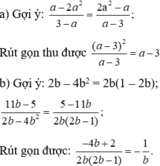

Hãy nhập câu hỏi của bạn vào đây, nếu là tài khoản VIP, bạn sẽ được ưu tiên trả lời.



Bài làm :
Bài 1 :
\(a,-2x^3y.\left(2x^2-3y+5y^2\right)\)
\(=-4x^5y+6x^3y^2-10x^3y^3\)
\(b,\left(x+1\right)\left(x^2-x+1\right)\)
\(=x^3-x^2+x+x^2-x+1\)
\(=x^3+1\)
\(c,\left(2x-1\right).\left(3x+2\right).\left(3-x\right)\)
\(=\left[\left(2x-1\right)\left(3x+2\right)\right]\left(3-x\right)\)
\(=\left(6x^2+4x-3x-2\right)\left(3-x\right)\)
\(=18x^2-6x^3+12x-4x^2-9x+3x^2-6+2x\)
\(=-6x^3+\left(18x^2-4x^2+3x^2\right)+\left(12x-9x+2x\right)-6\)
\(=-6x^3+17x^2+5x-6\)
Bài 2 :
\(\left(a+b\right).\left(a^3-a^2b+ab^2-b^3\right)\)
\(=a^4-a^3b+a^2b^2-ab^3+ba^3-a^2b^2+ab^3-b^4\)
\(=a^4+\left(-a^3b+ba^3\right)+\left(a^2b^2-a^2b^2\right)+\left(-ab^3+ab^3\right)-b^4\)
\(=a^4-b^4\)
=> đpcm
Học tốt nha

a) 3x3-2x2+2 chia x+1= 3x2-5x+5 dư -3 b) -3 chia hết x+1 vậy chon x =2
1)
a) \(-7x\left(3x-2\right)\)
\(=-21x^2+14x\)
b) \(87^2+26.87+13^2\)
\(=87^2+2.87.13+13^2\)
\(=\left(87+13\right)^2\)
\(=100^2\)
\(=10000\)
2)
a) \(x^2-25\)
\(=x^2-5^2\)
\(=\left(x-5\right)\left(x+5\right)\)
b) \(3x\left(x+5\right)-2x-10=0\)
\(\Leftrightarrow3x\left(x+5\right)-\left(2x-10\right)=0\)
\(\Leftrightarrow3x\left(x+5\right)-2\left(x-5\right)=0\)
\(\Leftrightarrow\left(x+5\right)\left(3x-2\right)=0\)
\(\Leftrightarrow\left[{}\begin{matrix}x+5=0\\3x-2=0\end{matrix}\right.\)
\(\Leftrightarrow\left[{}\begin{matrix}x=-5\\3x=2\end{matrix}\right.\)
\(\Leftrightarrow\left[{}\begin{matrix}x=-5\\x=\dfrac{2}{3}\end{matrix}\right.\)
Vậy..........
3)
a) \(A:B=\left(3x^3-2x^2+2\right):\left(x+1\right)\)

Vậy \(\left(3x^3-2x^2+2\right):\left(x+1\right)=\left(3x^2-5x-5\right)+7\)
b)
Để \(A⋮B\Rightarrow7⋮\left(x+1\right)\)
\(\Rightarrow\left(x+1\right)\in U\left(7\right)=\left\{-1;1-7;7\right\}\)

Vì x là số nguyên nên x=0 ; x=6 thì \(A⋮B\)

1. biến đổi vế trái
= a2x2 + a2y2 + b2x2 + b2y2
= (ax -by)2 + (bx+ ay)2 - 2abxy + 2abxy
= (ax -by)2 + ( bx + ay)2 = vế phải( dpcm)

a) \(x^7+x^5+1\)
\(=x^7-x+x^5-x^2+x^2+x+1\)
\(=x\left(x^6-1\right)+x^2\left(x^3-1\right)+\left(x^2+x+1\right)\)
\(=x\left(x^3+1\right)\left(x^3-1\right)+x^2\left(x-1\right)\left(x^2+x+1\right)+\left(x^2+x+1\right)\)
\(=x\left(x^3+1\right)\left(x-1\right)\left(x^2+x+1\right)+x^2\left(x-1\right)\left(x^2+x+1\right)+\left(x^2+x+1\right)\)]
\(=\left(x^2+x+1\right)\left[x\left(x^3+1\right)\left(x-1\right)+x^2\left(x-1\right)+1\right]\)
\(=\left(x^2+x+1\right)\left[x\left(x^4-x^3+x-1\right)+x^3-x^2+1\right]\)
\(=\left(x^2+x+1\right)\left(x^5-x^4+x^2-x+x^3-x^2+1\right)\)
\(=\left(x^2+x+1\right)\left(x^5-x^4+x^3-x+1\right)\)
b) \(x^5-x^4-1\)
\(=x^5-x^4+x^3-x^3+x^2-x-x^2+x-1\)
\(=x^3\left(x^2-x+1\right)-x\left(x^2-x+1\right)-\left(x^2-x+1\right)\)
\(=\left(x^2-x+1\right)\left(x^3-x-1\right)\)

Bài 1 :
a, \(\left(a-2\right)^2-b^2=\left(a-2-b\right)\left(a-2+b\right)\)
b, \(2a^3-54b^3=2\left(a^3-27b^3\right)=2\left(a-3b\right)\left(a^2+3ab+9b\right)\)
Bài 2 : tự kết luận nhé, ngại mà lười :(
a, \(\frac{4x+3}{5}-\frac{6x-2}{7}=\frac{5x+4}{3}+3\)
\(\Leftrightarrow\frac{4x-3}{5}-\frac{5x-4}{3}=\frac{6x-2}{7}+3\)
\(\Leftrightarrow\frac{12x-9-25x+20}{15}=\frac{6x-2+21}{7}\)
\(\Leftrightarrow\frac{-13x-29}{15}=\frac{6x+19}{7}\Rightarrow-91x-203=90x+285\)
\(\Leftrightarrow181x=-488\Leftrightarrow x=-\frac{488}{181}\)
b, \(\frac{x+2}{3}+\frac{3\left(2x-1\right)}{4}-\frac{5x-3}{6}=x+\frac{5}{12}\)
\(\Leftrightarrow\frac{4x+8+9\left(2x-1\right)}{12}-\frac{10x-6}{12}=\frac{12x+5}{12}\)
\(\Rightarrow4x+8+18x-9-10x+6=12x+5\)
\(\Leftrightarrow12x+5=12x+5\Leftrightarrow0x=0\)
Vậy phương trình có vô số nghiệm
c, \(\left|2x-3\right|=4\)
Với \(x\ge\frac{3}{2}\)pt có dạng : \(2x-3=4\Leftrightarrow x=\frac{7}{2}\)
Với \(x< \frac{3}{2}\)pt có dạng : \(2x-3=-4\Leftrightarrow x=-\frac{1}{2}\)
d, \(\left|3x-1\right|-x=2\Leftrightarrow\left|3x-1\right|=x+2\)
Với \(x\ge\frac{1}{3}\)pt có dạng : \(3x-1=x+2\Leftrightarrow2x=3\Leftrightarrow x=\frac{3}{2}\)
Với \(x< \frac{1}{3}\)pt có dạng : \(3x-1=-x-2\Leftrightarrow4x=-1\Leftrightarrow x=-\frac{1}{4}\)